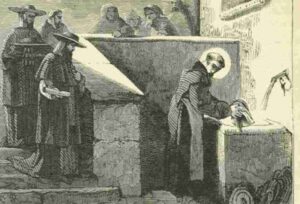
Ordinary Time as Holy Time
Imagine a Carmelite monastery in 17th-century Paris, France. Monks set about their daily task of ora et labora—prayer and work. Deep in a kitchen, hands buried in a basin of soapy water is Nicolas Herman, known to history as Brother Lawrence. Later, Brother Lawrence goes into his cell to pen a letter. He writes:
“The time of business does not with me differ from the time of prayer. In the noise and clutter of my kitchen, while several persons are at the same time calling for different things, I possess God in as great tranquility as if I were upon my knees at the Blessed Supper.”
Brother Lawrence became famous for his ordinary existence as a dishwasher at a monastery, washing every dish to the glory of God. In the mundanity of his vocation, Brother Lawrence came to know the presence of God.
This is the crux of Ordinary Time. During this season, we have liturgical permission to go about our ordinary days, take up our ordinary tasks, and carry out our ordinary lives. But as Brother Lawrence reminds us, Ordinary Time is a holy time. It is a time to become aware that the presence of God occupies every space, not just the spaces we deem sacred. The invitation of Ordinary Time is to behold the world around us through the eyes of the One who created and redeemed it.
Implicit in Ordinary Time and hidden in ordinary people is the splendor and majesty of the Triune God. Brother Lawrence compares one of life’s most mundane tasks—washing dishes—to partaking in the Body and Blood of Jesus Christ. In the epistle reading appointed for this coming Sunday, St. Paul helps us understand why this is: “For you know the grace of our Lord Jesus Christ, that though he was rich, yet for your sake he became poor, so that you by his poverty might become rich” (2 Cor. 8:9). Almighty God, through his son, Jesus Christ, turns reality on its head. In his omnipotence, he entered the world as a powerless child. In his omniscience, he subjected himself to training and temptation. In his wealth, he became poor. In other words, Jesus became ordinary.
And so, during Ordinary Time, we walk with a Jesus who walked. We work with a Jesus who worked. We pray with a Jesus who prayed. Our dish-washing and our gardening and our commuting and our email-checking may become for us an opportunity to “possess God in as great tranquility as if we were upon our knees at the Blessed Supper.” In so doing, all that we call “common” or “ordinary” in this life takes on a tinge of holiness.
In Christ,
Bree Snow
Minister for Formation and Catechesis

